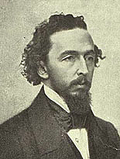Thus Came The Poet's Journal To An End
by Bayard Taylor
Thus came the Poet's Journal to an end.
His heart's completed music ceased to flow
From Ernest's lips: the tale I wished to know
Was wholly mine. I am content, dear friend,
I said: to me no voice can be obscure
Wherein your nature speaks: the chords I hear,
Too far and frail to strike a stranger's ear.
With that, I bowed to Edith's forehead pure,
And kissed her with a brother's blameless kiss:
To you the fortune of these days I owe,
My other Ernest, like him most in this,
That you can hear the cries of ancient woe
With holy pity, free from any blame
Of jealous love, and find your highest bliss
To know, through you his life's fulfilment came.
And through him, mine,
the woman's heart replied;
For Love's humility is Love's true pride.
These are your sweetest poems, and your best,
To him I said. I know not,
answered he,
They are my truest. I have ceased to be
The ambitious knight of Song, that shook his crest
In public tilts: the sober hermit I,
Whose evening songs but few approach to hear, --
Who, if those few should cease to lend an ear,
Would sing them to the forest and the sky
Contented: singing for myself alone.
No fear that any poet dies unknown,
Whose songs are written in the hearts that know
And love him, though their partial verdict show
The tenderness that moves the critic's blame.
Those few have power to lift his name above
Forgetfulness, to grant that noblest fame
Which sets its trumpet to the lips of Love!
Nay, then,
said I, you are already crowned.
If your ambition in the loving pride
Of us, your friends, is cheaply satisfied,
We are those trumpets: do you hear them sound?
And Edith smilingly together wound
Light stems of ivy to a garland fair,
And pressed it archly on her husband's hair;
But he, with earnest voice, though in his eyes
A happy laughter shone, protesting, said:
Respect, dear friends, the Muse's sanctities,
Nor mock, with wreaths upon a living head,
The holy laurels of the deathless Dead.
Crown Love, crown Truth when first her brow appears,
And crown the Hero when his deeds are done:
The Poet's leaves are gathered, one by one,
In the slow process of the doubtful years.
Who seeks too eagerly, he shall not find:
Who, seeking not, pursues with single mind
Art's lofty aim, to him will she accord,
At her appointed time, the sure reward.
The tall clock, standing sentry in the hall,
Struck midnight: on the panes no longer beat
The weary storm: the wind began to fall,
And through the breaking darkness glimmered, sweet
With tender stars, the flying gleams of sky.
Come, Edith, lend your voice to crown the night,
said I:
And give the new day sunny break,
She, listening first in self-deceiving plight
Of young maternal trouble, for a cry
From Arthur's crib, sat down in happy calm,
And sang to Ernest's heart his own thanksgiving psalm:
Thou who sendest sun and rain,
Thou who spendest bliss and pain,
Good with bounteous hand bestowing,
Evil for Thy will allowing, --
Though Thy ways we cannot see,
All is just that comes from Thee.
In the peace of hearts at rest,
In the child at mother's breast,
In the lives that now surround us,
In the deaths that sorely wound us,
Though we may not understand,
Father, we behold Thy hand!
Hear the happy hymn we raise;
Take the love which is Thy praise;
Give content in each condition;
Bend our hearts in sweet submission,
And Thy trusting children prove
Worthy of the Father's love!
Source:
The Poet's JournalCopyright 1863
Ticknor and Fields, Boston
